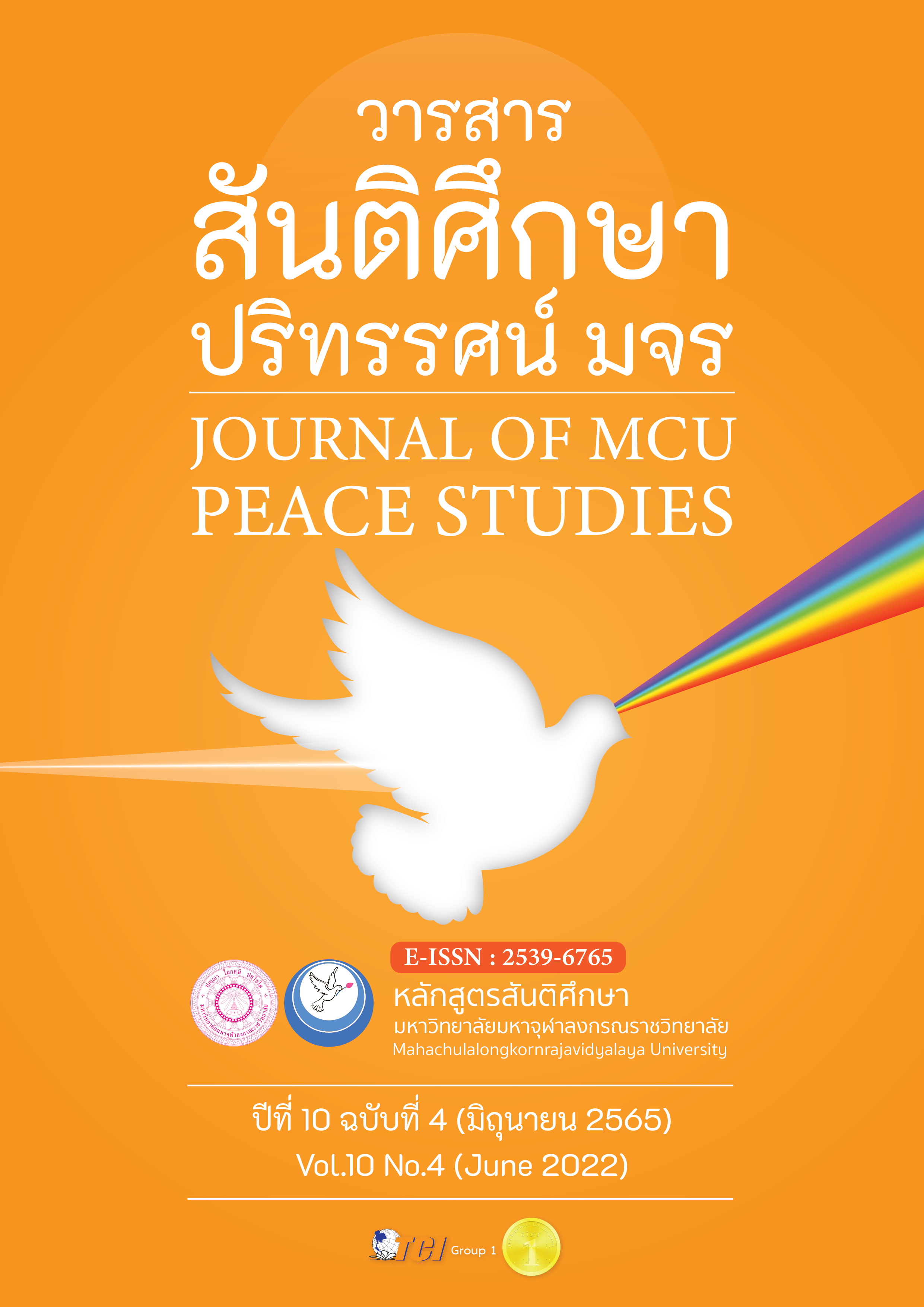ศิลปศึกษาจากคุณค่าสู่มูลค่าผ่านธุรกิจออนไลน์
Main Article Content
บทคัดย่อ
ความก้าวหน้าทางเทคโนโลยีดิจิทัลส่งผลให้การศึกษาต้องเร่งพัฒนาทรัพยากรมนุษย์ให้พร้อมและสามารถรับมือการเปลี่ยนแปลง ศิลปศึกษาพัฒนาผู้เรียนเพื่อนำไปสู่การเรียนรู้ในศตวรรษที่ 21 และยังได้รับผลกระทบจากการเปลี่ยนแปลงเทคโนโลยีทั้งด้านการเรียนและการสอน ผู้เรียนจึงจำเป็นต้องมีความรู้ในการใช้เทคโนโลยีดิจิทัลเพื่อการดำเนินธุรกิจศิลปะและรับมือแนวโน้มการเปลี่ยนแปลงของเทคโนโลยีที่ส่งผลต่อการปรับตัวของศิลปศึกษาในเชิงเศรษฐกิจ ซึ่งจะส่งผลไปถึงการประกอบอาชีพเกี่ยวกับศิลปะในอนาคต นอกจากนี้สถานการณ์โควิด-19 ยังทำให้เกิดฐานวิถีชีวิตใหม่ (New Normal) และจากการวิเคราะห์เว็บไซต์ธุรกิจศิลปะ พบว่าการเรียนการสอนศิลปะจำเป็นต้องปรับให้สอดคล้องกับการสร้างมูลค่าผ่านธุรกิจออนไลน์ บทความนี้มีวัตถุประสงค์เพื่อนำเสนอแนวทางการดำเนินธุรกิจที่เกี่ยวข้องกับศิลปะให้สามารถสร้างสรรค์ผลงานที่สะท้อนถึงคุณค่าของศิลปศึกษาในเชิงเศรษฐกิจในยุคดิจิทัลและเพื่อนำเสนอแนวทางการพัฒนาองค์ความรู้ของศิลปศึกษาที่สอดรับกับการเปลี่ยนแปลงของโลก ทั้งนี้ศิลปศึกษาสร้างคุณค่าสู่มูลค่าผ่านธุรกิจออนไลน์จากพหุศิลปศึกษาเชิงแบบแผน มีองค์ความรู้ 4 ด้าน ดังนี้ 1) ความรู้ศิลปะ ได้แก่ ประวัติศาสตร์ศิลป์ สุนทรียศาสตร์ ศิลปะวิจารณ์ และศิลปะปฏิบัติ 2) ทักษะ 7C ได้แก่ การคิดขั้นสูง การสื่อสาร การทำงานร่วมกับผู้อื่น การเข้าใจความแตกต่างระหว่างบุคคล การใช้คอมพิวเตอร์และรู้เท่าทันเทคโนโลยี การมีคุณธรรม ความฉลาดทางอารมณ์ 3) ความรู้ยุคดิจิทัล ได้แก่ เทคโนโลยีและนวัตกรรม เศรษฐกิจดิจิทัล การตลาดแบบผสมผสาน และความรู้เกี่ยวกับการตลาดศิลปะ 4) ทักษะผู้ประกอบการศิลปะ ได้แก่ ทักษะความคิด ทักษะด้านโอกาส ทักษะเชิงกลยุทธ์ ทักษะเครือข่าย ทักษะการเป็นผู้นำ ทักษะบริหารการเงิน ทักษะการขายและการตลาด
Article Details

อนุญาตภายใต้เงื่อนไข Creative Commons Attribution-NonCommercial-NoDerivatives 4.0 International License.
ทัศนะและความคิดเห็นที่ปรากฏในบทความในวารสาร ถือเป็นความรับผิดชอบของผู้เขียนบทความนั้น และไม่ถือเป็นทัศนะและความรับผิดชอบของกองบรรณาธิการ ยินยอมว่าบทความเป็นลิขสิทธิ์ของวารสาร
เอกสารอ้างอิง
Asian Development Bank. (2018). South Asia Regional Symposium on ICT for Education.Retrieved August 12, 2020, from https://teams.unesco.org/ORG/fu/bangkok/public_events/Shared%20Documents/EISD/2018/FebSARSIE/Knowledge%20Brochure%20Series%20-%20Issue%206_SARSIE_Oct19.pdf
Charoenwong, M. (2019). Citizens Make Media-Media Make Citizen: Digital Citizen and Social Phenomena Amid the Changing Trends of Media Users and Media Landscape. Nonthaburi: Phappim.
Chobdamrongtham, N., Adisornprasert, W., & Yansomboon, S. (2011). The Influence of Advertising on Online Social Network to Consumer Response Process. Journal of Humanities and Social Sciences, 3(6), 12-26.
Depa. (2019). What is the Big Data? Retrieved August 3, 2020, from https://www.depa.or.th/th/article-view/article-big-data
Digital Council for the Economy and Society of Thailand A.D. 2019. (2019). Government Gazette. Vol. 136 No. 56 A. pp. 69-84.
Digital Government Development Agency. (2019). Blockchain of Government Services –Using Blockchain Technology for Government Sector. Retrieved August 3, 2020, from https://www.dga.or.th/upload/download/file_ff487bacfb3198a615ca75112b8d156c.pdf
Eurostat. (2018). Culture statistics-Cultural employment. Retrieved August 12, 2020, from https://ec.europa.eu/eurostat/statisticsexplained/index.php/Culture_statistics__cultural_employment#Some_other_characteristics_of_cultural_employment
Feldman, E. B. (1996). Philosophy of Art Education. New Jersey: Prentice-Hall.
Hedayat, M. et al. (2013). The Effect of DBAE Approach on Teaching Painting of Undergraduate Art Students. Educational Research and Reviews, 8(15), 1322-1330.
Hiscox. (2019). Hiscox Online Art Trade Report 2019. Retrieved August 12, 2020, from https://www.hiscox.co.uk/online-art-trade-report
International Labour Office. (2017). World Employment Social Outlook. Geneva: Author.
International Labour Office. (2020). ILO Monitor: COVID-19 and the World of Work. (2nd ed.). Geneva: Author.
Kuljitjuerwong, S. (2017). Online Publishing Material Guideline in Digital Era. NIDA Journal of Language and Communication, 21(29), 37-55.
Ma, X., & Yang, S. (2018). Airtasker and the Australian Freelance Workers: The Reflections on the Gig Economy. International Journal of Advanced and Applied Sciences, 5(7), 35-45.
McAndrew, C. (2020). The Impact of COVID-19 on the Gallery Sector. Retrieved August 12, 2020, from https://www.artbasel.com/about/initiatives/the-art-market
Ministry of Education Singapore. (2015). ICT Masterplan in Singapore. Retrieved August 12, 2020, from http://www.unesco.org/new/fileadmin/MULTIMEDIA/HQ/ED/images/singapore.pdf
Ministry of Education Singapore. (2020). Schools to Implement One Day of Home-Based Learning a Week. Retrieved August 15, 2020, from https://www.moe.gov.sg/news/press-releases/schools-to-implement-one-day-of-home-based-learning-a-week
National Arts Council Singapore. (2017). Population Survey on the Arts. Retrieved August 15, 2020, from https://www.nac.gov.sg/whatwedo/support/research/Research-Main-Page/Arts-Statistics-and-Studies/Participation-and-Attendance/population-survey.html
National Arts Council Singapore. (2018). Our SG Arts Plans. Retrieved August 15, 2020, from https://www.nac.gov.sg/aboutus/Our-SG-Arts-Plan-2018-2022.html
Office of the Permanent Secretary, Ministry of Education. (2009). “Art” from Curriculum to School. Retrieved August 3, 2020, from https://www.moe.go.th/moe/th/news/detail.php?NewsID=9987&Key=news_research
Panit, V. (2013). Building Learning into the 21st Century. Bangkok: S. Charoenkhanpim.
Pichayapaiboon, P. (2019). Aesthetics and Art. Bangkok: Chulalongkorn University Printing House.
Rubiao, R. M. (2018). A Short but Deep Dive into the Economics of Arts: Art Entrepreneurs in a Peripheral Market. Artivate, 7(2), 3-26.
Schwab, K., & Davis, N. (2018). Shaping the Fourth Industrial Revolution. (2nd ed.). (Mekpaiboon, Translator). Bangkok: AmarinHow-To.
Sidorova, E. (2019). The Cyber Turn of the Contemporary Art Market. Arts, 8(3), 1-11.
Smith, R. A. (1987). The Changing Image of Art Education: Theoretical Antecedents of Discipline-Based Art Education. Journal of Aesthetic Education, 21(2), 3-34.
State Council of the People’s Republic of China. (2017). China issues guideline on artificial intelligence development. Retrieved August 12, 2020, from http://english.www.gov.cn/policies/latest_releases/2017/07/20/content_281475742458322.htm
Thailand Creative & Design Center. (2019). Singapore and the Plan for upgrading “Happiness Level” in society through Art. Retrieved August 3, 2020, from https://web.tcdc.or.th/th/Articles/Detail/Singapore-CEA-Forum-2019
Thom, M. (2016). Crucial Skills for the Entrepreneurial Success of Fine Artists. Artivate, 5(1), 3-24.
UNESCO. (2020a). Distance Learning Solutions: More on UNESCO's COVID-19 Education Response. Retrieved August 15, 2020, from https://en.unesco.org/covid19/educationresponse/solutions
UNESCO. (2020b). Education: From Disruption to Recovery -COVID-19 Impact on Education. Retrieved August 15, 2020, from https://en.unesco.org/covid19/educationresponse


